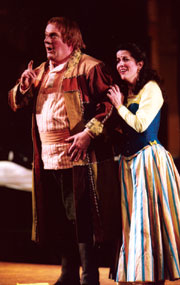|
 Pucciniís
Next-to-Last Opera Scores High Grades in London Pucciniís
Next-to-Last Opera Scores High Grades in London
By
IRVING SPITZ
Special
to Education Update, London
In
its early days, the English National Opera (ENO) performed at
the Sadlerís Wells theater in London. In 1968, after almost 40
years, it moved to its present venue, the Coliseum. Regardless
of its location, ENO remains one of Britainís great cultural icons
ENO
seeks to produce high-quality opera sung in English at affordable
prices. The company was certainly successful in a performance
of Pucciniís penultimate opera, Il Trittico (The Triptych),
a trilogy of three operas comprising Il Tabarro (The Cloak),
Suor Angelica (Sister Angelica) and Gianni Schicchi.
Il
Tabarro deals with a clandestine love affair between Giorgetta,
wife of the barge owner Michele, and the stevedore Luigi. When
Michele finds out, he stabs Luigi to death and conceals the body
in his cloak. In the second opera, Sister Angelica becomes a nun
after bearing an illegitimate child and subsequently commits suicide
after learning of the death of her child. The final opera is a
comic masterpiece. At the request of the family of a recently
deceased miser, Gianni Schicchi impersonates the miser at his
deathbed, redrafts the will in the presence of a notary and, to
the chagrin of the family, bequeaths to himself the whole estate.
This last opera is adapted from Danteís Inferno.
Gianni
Schicchi, the most popular, is perhaps one of the finest comedies
ever composed and it is often performed without its companions.
Nevertheless there is logic in performing the three operas in
sequence to experience the progression from melodrama through
tragic innocence to comedy. Il Trittico remains one of
the most satisfying of all of Pucciniís operas.
Patrick Mason has managed to draw a memorable performance from
the ENOís uniformly fine cast. The sets by Joe Vaneck mirrored
the mood of the operas. The staging in Il Tabarro was dark
and gloomy while in Suor Angelica the bright colors in
the convent suggested an air of innocence without the impending
tragedy. The Renaissance bedchamber and costumes in Gianni
Schicchi were in keeping with the comedy.
The soprano Cheryl Barker took on the role of the unhappy wife
Giorgetta in Il Tabarro as well as the challenging role
of Sister Angelica. In addition to its vocal demands, this latter
role calls for great stage presence and acting ability. Barker
proved up to the task with her bright, clear soprano and brought
ardor and impassioned lyricism to both roles.
In Il Tabarro, her husband, Michele, was sung effectively
by robust baritone Peter Coleman-Wright. The light lyrical tenor
Bonaventura Bottone was her lover Luigi who brought the required
ardor and passion to the role. Andrew Shore portrayed Gianni Schicchi
and was most successful both with his stylish acting and rich
voiced baritone. The supporting cast in all three operas was strong,
especially the radiant soprano of Mary Plazas as Laurettta in
Gianni Schicchi. The resident conductor, Noel Davies, led
the orchestra passionately in a well-paced account of the score.
The result was a performance that was inspiring and moving.
The ENO nurtures young British singers, and there are many who
received their first break here. Jane Eaglen, for example, first
came to international attention with her performance in Cavalleria
Rusticana in 1986. In addition to its formal season at the
Coliseum, the ENO also operates an outreach program with schools
in the east south of England, with the aim of developing opera
awareness and encouraging creative activity. This outstanding
program also enables participants to attend free of charge. The
ENO is central to the operatic life of London.
Education Update, Inc., P.O. Box 20005, New York, NY 10001. Tel:
(212) 481-5519. Fax: (212) 481-3919. Email: ednews1@aol.com.
All material is copyrighted and may not be printed without express consent of
the publisher. © 2001.
|

